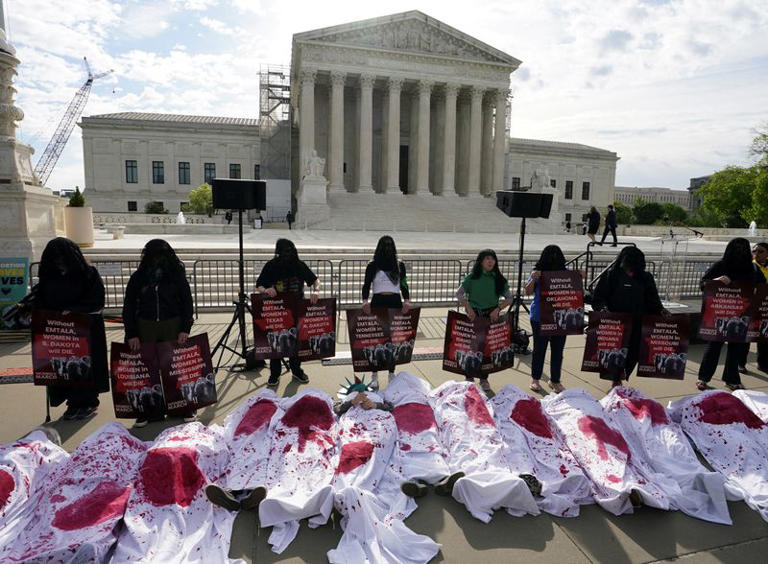The U.S. Supreme Court on Wednesday waded back into the battle over abortion access during arguments in a case pitting Idaho’s strict Republican-backed abortion ban against a federal law that ensures that patients can receive emergency care.
The justices are hearing an appeal by Idaho officials of a lower court’s ruling that found that the 1986 U.S. law at issue, the Emergency Medical Treatment and Labor Act (EMTALA), supersedes the state’s near-total ban in the relatively rare circumstances when the two conflict.
President Joe Biden’s administration, which sued Idaho over the abortion law, has urged the justices to uphold that ruling.
The arguments were ongoing.
The case has led the Supreme Court, with its 6-3 conservative majority, to revisit the fraught legal landscape it created with its June 2022 decision overturning the 1973 Roe v. Wade ruling that had legalized abortion nationwide.
Idaho’s so-called abortion “trigger” law adopted in 2020 automatically took effect upon Roe’s reversal. The state law bans nearly all abortions unless needed to prevent a mother’s death, threatening doctors who violate it with two to five years in prison and loss of their medical license.
Idaho is one of seven states to put in place in the past two years a near-total abortion ban with no exception to protect the health of pregnant patients, according to a U.S. Justice Department filing.
At the same time, EMTALA requires hospitals that receive funding under the federal Medicare program to “stabilize” patients with emergency medical conditions. Hospitals that violate EMTALA can face lawsuits by injured patients, civil fines and potentially the loss of Medicare funding.
At issue in the case is whether Idaho’s ban must yield to EMTALA when a doctor determines that the necessary “stabilizing care” is an abortion that would not meet Idaho’s narrow exception for preventing the mother’s death.
Joshua Turner, a lawyer for Idaho, told the justices that “nothing in EMTALA requires doctors to ignore the scope of their license and offer medical treatments that violate state law.” Turner asked the justices to “reject the administration’s unlimited reading of EMTALA.”
Turner argued that Idaho’s ban does not conflict with federal law because EMTALA does not require doctors to offer specific procedures such as abortion. Turner also said that Congress enacted EMTALA to prevents hospitals from refusing to treat uninsured patients, so Idaho’s abortion ban does not thwart the aim of lawmakers.
Following Roe’s demise, the Biden administration issued federal guidance stating that EMTALA takes precedence over state abortion bans when the two conflict, and filed a lawsuit challenging Idaho’s ban.
‘TAKE OFF THE TABLE’
The court’s three liberal justices posed sharp questions to Turner.
Liberal Justice Ketanji Brown Jackson told Turner that it is plain on the face of the statute that EMTALA is about the provision of stabilizing care for people experiencing emergency medical conditions and that the law displaces the prerogatives of hospitals or states in this fairly narrow slice of the healthcare universe.
“We agree that EMTALA does impose a federal stabilization requirement,” Turner said. “But the question here is: what is the content of that stabilization requirement? And for that you have to reference state law.”
Liberal Justice Elena Kagan told Turner, “We can just take off the table this idea that, you know, just because it’s a state and it’s healthcare that the federal government has nothing to say about it. The federal government has plenty to say about it in this statute.”
Liberal Justice Sonia Sotomayor told Turner his argument put “preemption on its head.”
“The whole purpose of preemption is to say that if the state passes a law that violates federal law, the state law is no longer effective,” Sotomayor said.
Jackson added, “Idaho law seems to say you cannot provide that treatment unless doing so is necessary to prevent a patient death to the extent the treatment involves abortion. Why is that not a direct conflict you have?”
Elizabeth Prelogar, the U.S. solicitor general who argued on behalf of the administration, said in a filing that the termination of a pregnancy is the only care that would prevent grave harm to the health of some pregnant women facing emergency complications.
Boise-based U.S. District Judge B. Lynn Winmill in 2022 blocked enforcement of Idaho’s law in cases of abortions that are needed to avoid putting the woman’s health in “serious jeopardy” or risking “serious impairment to bodily functions.”
Medical experts have said conditions that could threaten the woman’s life and health – from gestational hypertension to excessive bleeding – could require an abortion to stabilize her or avoid seizures, vital organ damage and failure, or the loss of the uterus.
The Supreme Court in January let Idaho enforce its law while also agreeing to decide its legality.
Hundreds of demonstrators gathered outside the court building ahead of the arguments, mostly abortion rights advocates but some abortion opponents as well. Anti-abortion protesters chanted “Pro-choice is a lie, babies never choose to die.” In response, abortion rights protesters yelled, “Pro-life is a lie, they don’t care if people die.” (Reuters)



